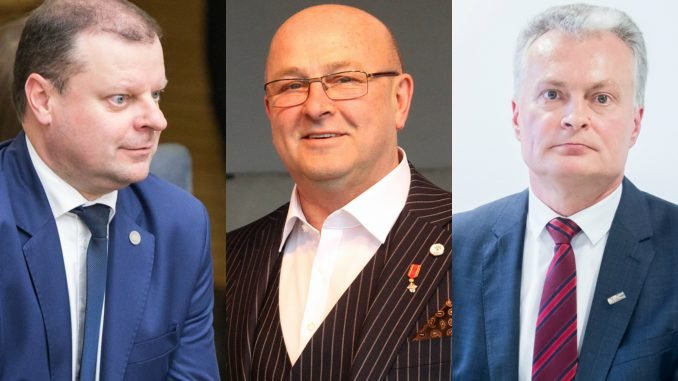
The first clearer changes in the list of potential presidents have occurred with potential candidates starting to declare their intentions. Kaunas Mayor Visvaldas Matijošaitis has dropped out of the top three.
According to a poll by the public opinion and market research company Spinter Tyrimai commissioned by Delfi on September 19-26, economist Gitanas Nausėda remained in first place, reinforcing his positions. He was backed by 25.1% of respondents in September, up from 19.7% in late August.
The popularity of the next four potential candidates differs only by 3.1%, which is within the survey’s error margins. In second place for September was Prime Minister Saulius Skvernelis, up from third last month. His popularity in the September survey reached 10.5%, compared to 10.7% in August.
Former Minister of Finance Ingrida Šimonytė has risen to third, with 10.3% support in September, up from 8% in August. Last month, she was in fifth among the potential candidates.
Fourth place, same as the previous month, went to Vygaudas Ušackas, who had support of 9.8% in September, up from 8.3% in August.
Kaunas Mayor Visvaldas Matijošaitis dropped from second place to fifth, going from 14.4% support in August to 8.3% in September.
Next in the survey is Social Democratic MEP Vilija Blinkevičiūtė with 5.4% support. 1.6% of respondents would vote for Vilnius Mayor, Remigijus Šimašius, followed by Conservative MP Žygimantas Pavilionis and Farmer-Greens leader Ramūnas Karbauskis, both at 1.5% support. Next follows MP Aušra Maldeikienė (1.4% support), MEP Antanas Guoga (1.2%), MP Naglis Puteikis and European Commissioner Vytenis Povilas Andriukaitis (1% each) and MEP Valentinas Mazuronis (0.5%).
12.1% would choose a different candidate, while 8.8% do not know, who to vote for or would not vote.
Fewer undecided
Spinter Tyrimai head, sociologist Ignas Zokas noted that the candidates viewed as having the most prospects have already begun declaring their intent to run for president.
“Due to this, we can see changes – support for G. Nausėda rising (this is the first survey following him declaring he will run for president), I. Šimonytė declared her participation in the midst of the survey.
The other candidates have already declared or are giving clearer signals that they will not participate in the elections, for example, Ž. Pavilionis and V. Matijošaitis. Their ratings are declining because people are choosing from more likely to participate candidates,” I. Zokas commented.
Protest Lithuania, which prefers more acutely speaking politicians, is currently also more oriented toward survey leaders, the sociologist stated.
“An individual is perhaps easier to comprehend for another person than is a political entity such as a party, which is difficult for even political scientists to understand at times. The candidates seen as stronger are selected,” I. Zokas said.
According to him, higher income, urban citizens are more inclined toward G. Nausėda, while lower income citizens prefer S. Skvernelis.
Where two are fighting… the other two win
Vytautas Magnus University (VDU) political scientist, professor Lauras Bielinis believes that the two most likely the two key rivals in the elections will be G. Nausėda and S. Skvernelis.
“I believe that the major competition will be between S. Skvernelis and G. Nausėda. The right wing will vote for the Conservative backed candidate, but they do not form the majority of voters, not even a third,” L. Bielinis said.
The political scientist notes a danger that the competition between I. Šimonytė and V. Ušackas may prove counterproductive and antagonise groups supporting the Conservatives.
“Those, who support V. Ušackas, are viewing those intent on supporting I. Šimonytė increasingly aggressively. Those, who support I. Šimonytė view those, who support V. Ušackas with increasing suspicion. In my opinion, this could develop into a major fracture among right wing voters and grant benefits to neither candidate, who would represent the Conservatives,” L. Bielinis said.
The presidential elections are to be held in May next year.

Be the first to comment